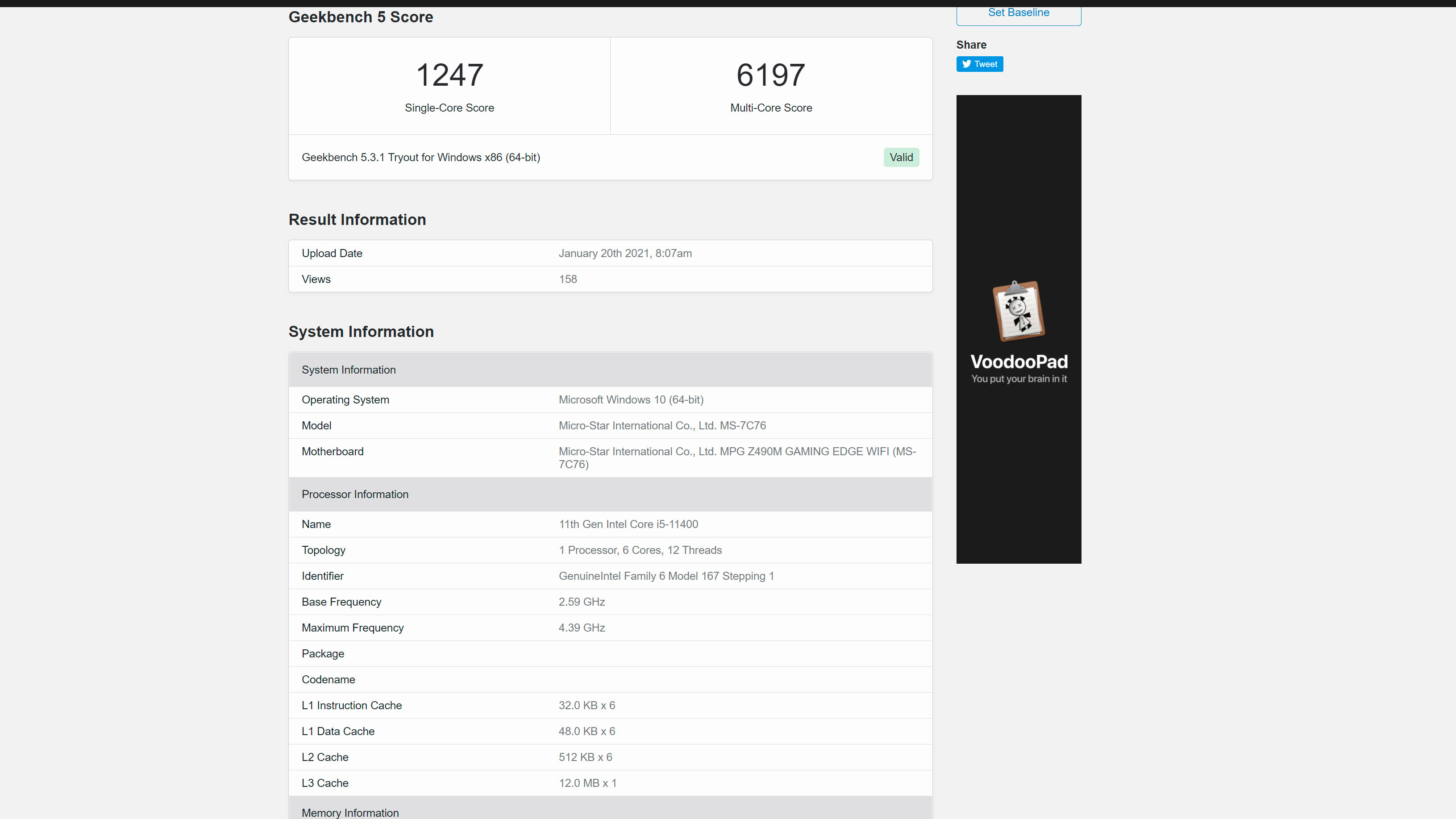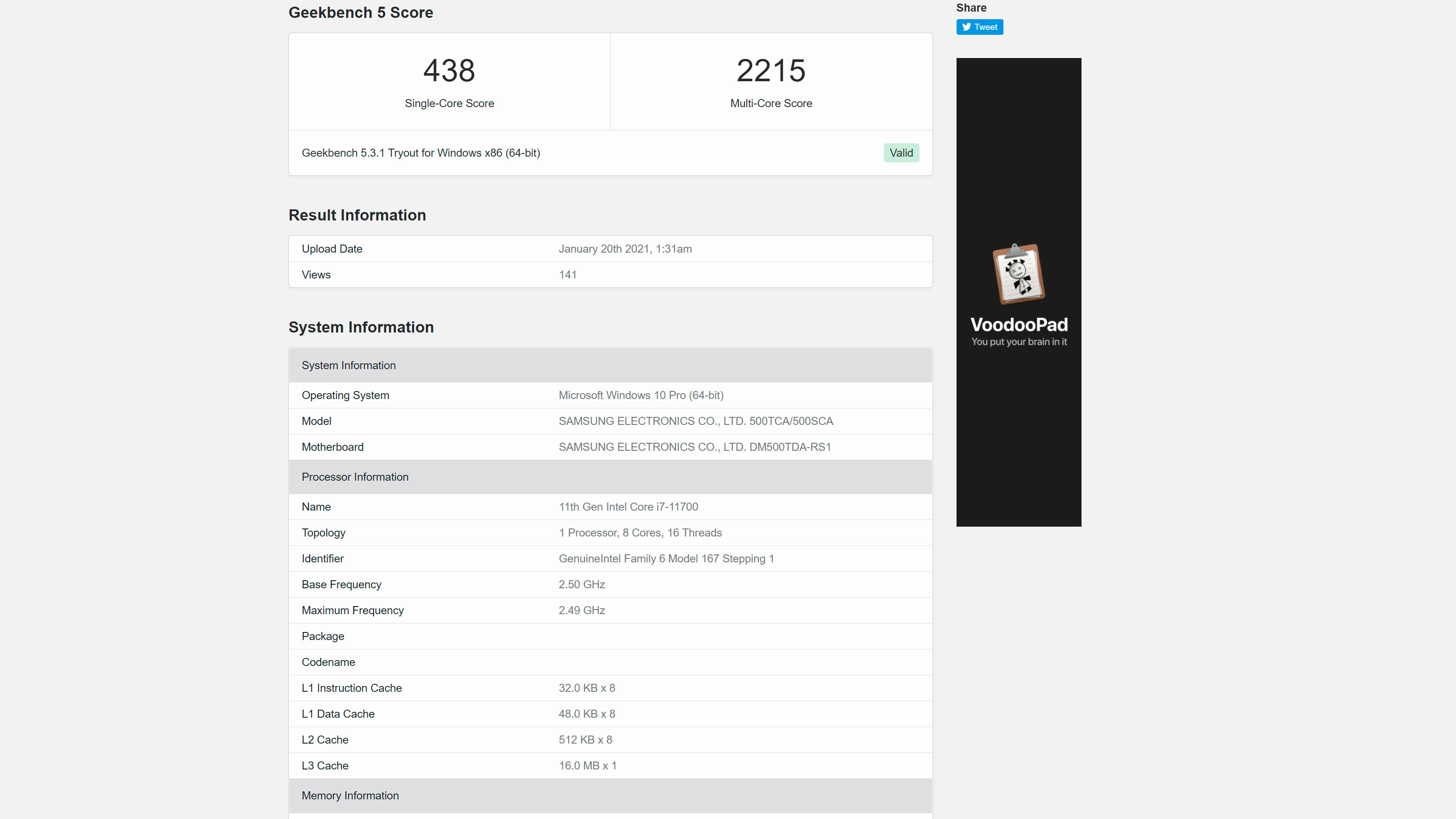Intel Core i5-11400, Core i7-11700 Show Good IPC Gains
Intel's 11th Generation Rocket Lake-S processors will likely make their debut in late March, but that doesn't mean that the rumor mill will stop churning. The Core i5-11400 and Core i7-11700 (via Tum_Apisak) are the two latest Rocket Lake-S parts to break cover, and it looks like they could shake up our CPU Benchmarks Hierarchy when they come to market.
By now, Rocket Lake-S shouldn't need any introductions. The approaching 14nm chips leverage Intel's Cypress Cove microarchitecture, which is basically a backport of the 10nm Sunny Cove cores from Ice Lake chips. Rocket Lake-S also features Xe LP graphics and natively supports PCIe 4.0 and DDR4-3200 memory modules. The processors will continue to slot into the LGA1200 socket, but it's probably the last generation of chips to use the socket before Intel transitions to the LGA1700 socket for Alder Lake-S.
The Core i5-11400 comes furnished with six cores, 12 threads and up to 12MB of L3 cache. The hexa-core chip seemingly features a 2.6 GHz base clock and 4.4 GHz boost clock. The Core i7-11700, in return, sports eight cores, 16 threads and a 16MB L3 cache. The processor appears to have a 2.5 GHz base clock and 2.5 GHz boost clock, but the latter looks like a misreport (or a limitation of an engineering sample). In any event, neither processor carries a suffix, conveying that these are 65W Rocket Lake-S SKUs.
Intel 11th Generation Rocket Lake-S Specifications
| Processor | Cores / Threads | Base / Boost Clocks (GHz) | L3 Cache (MB) |
|---|---|---|---|
| Core i7-11700* | 8 / 16 | 2.5 / 2.5? | 16 |
| Core i7-10700 | 8 / 16 | 2.9 / 4.8 | 16 |
| Core i5-11400* | 6 / 12 | 2.6 / 4.4 | 12 |
| Core i5-10400 | 6 / 12 | 2.9 / 4.3 | 12 |
*Specifications are unconfirmed.
The Core i5-11400 had single- and multi-core scores of 1,247 and 6,197 points, respectively, in Geekbench 5. According to the average metrics, the Core i5-10400 delivers a single-and multi-core score 1,115 points and 5,676, respectively. Therefore, the Core i5-11400 offers up to 11.8% higher single-core performance and up to 9.2% better multi-core performance than the current Core i5-10400.
The Core i7-11700's scores are lower than the Core i5-11400, so the run was not particularly useful and influenced by the lower clock speed. This isn't unusual because unreleased hardware doesn't always play nice with some benchmarking software. As evidenced by the Core i7-11700's low boost clock speed, something (maybe cooling or firmware) was holding the octa-core processor back during the benchmark.


Although Intel has allowed motherboard vendors to show off their shiny Z590 motherboards, the chipmaker hasn't officially released Rocket Lake-S yet or provided detailed specifications. Intel has repeatedly stated that the chips will arrive in the first quarter of this year.
Get Tom's Hardware's best news and in-depth reviews, straight to your inbox.
Since Alder Lake-S launches in the second half of the year, it's safe to assume that Rocket Lake-S will have to debut around March time. After all, Rocket Lake-S is just the band-aid solution to hold off AMD's Ryzen 5000 processors until Alder Lake-S is ready for airtime. Assuming Alder Lake and its Golden Cove high performance cores are up to snuff, naturally.

Zhiye Liu is a news editor, memory reviewer, and SSD tester at Tom’s Hardware. Although he loves everything that’s hardware, he has a soft spot for CPUs, GPUs, and RAM.
-
mdd1963 "..The processor appears to have a 2.5 GHz base clock and 2.5 GHz boost clock, "Reply
That boost clock doesn't sound very...'boosty' sort of impressive...
Let's hope that's some sort of typo.... -
Co BIY What does this mean for the 10nm chips when they finally debut?Reply
At some point will improving the microarchitecture design matter more than moving to a smaller process node ?